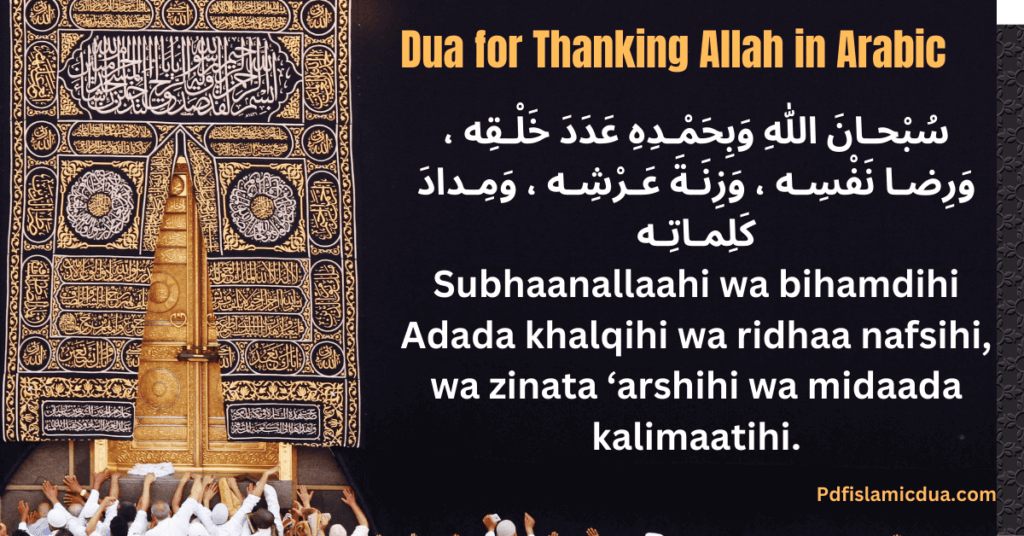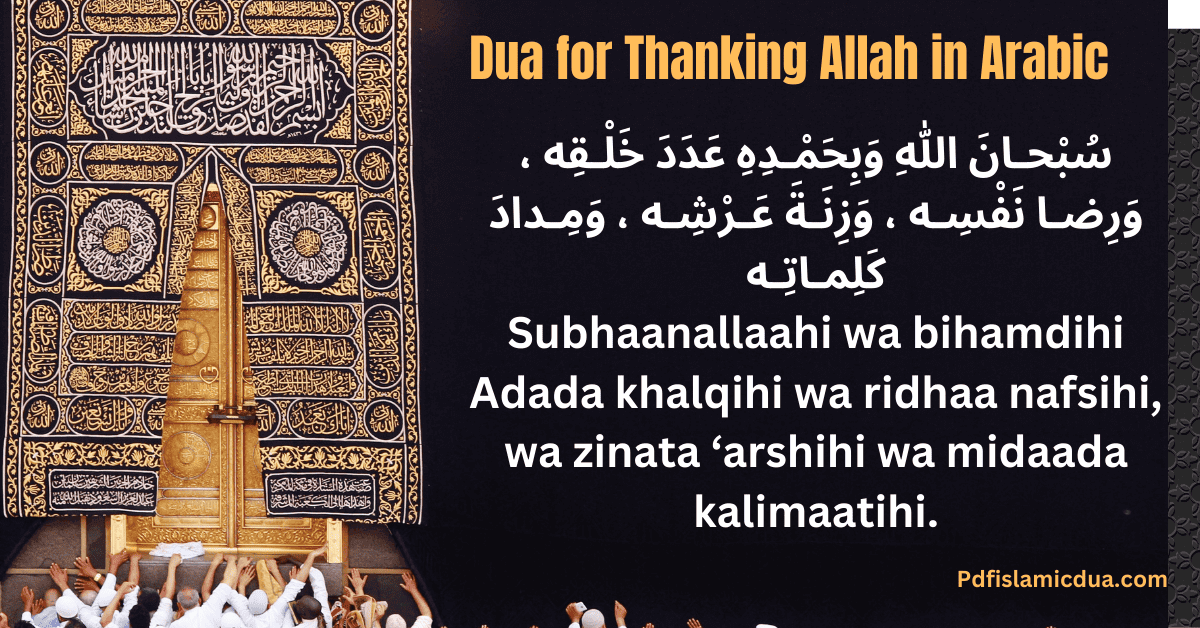Blog
Dua & Surah PDF
#thanking, allah, allah muhammad, amazing dua for thanking allah, best dua for allah's blessings, best dua for thanking allah, best dua to thank allah for each day and night, dua for everyday, dua for last day of ramadan to thank allah for everything, dua for thanking allah, dua thanking god, listen daily to thanking allah, thank you allah, thank you so much ya allah dua for thanking allah everyday!, thanks to allah
pdfislamicdua
0 Comments
Dua for Thanking Allah in Arabic PDF
Expressing gratitude to Allah(Dua for Thanking Allah) is a key part of being a Muslim. Muslims believe that all blessings come from Allah, and it’s important to thank Him for these gifts. Saying specific prayers, or duas, for gratitude helps Muslims feel thankful and humble, reminding them of Allah’s kindness and generosity.
Download Dua for Thanking Allah

Dua for Thanking Allah in Arabic PDF
The Prophet ﷺ taught us to praise Allah and thank Him for all the blessings He has given us.
Praising Allah and Giving Thanks
سُبْحـانَ اللهِ وَبِحَمْـدِهِ عَدَدَ خَلْـقِه ، وَرِضـا نَفْسِـه ، وَزِنَـةَ عَـرْشِـه ، وَمِـدادَ كَلِمـاتِـه
Subhaanallaahi wa bihamdihi Adada khalqihi wa ridhaa nafsihi, wa zinata ‘arshihi wa midaada kalimaatihi.
Glory is to Allaah and praise is to Him, by the multitude of his creation, by His Pleasure, by the weight of His Throne, and by the extent of His Words (Recite 3 times)
Derivation
Juwairiya reported that Allah’s Messenger (ﷺ) came out from (her apartment) in the morning as she was busy in observing her dawn prayer in her place of worship. He came back in the forenoon and she was still sitting there. He (the Holy Prophet) said to her:
You have been in the same seat since I left you. She said: Yes. Thereupon Allah’s Apostle (ﷺ) said: I recited four words three times after I left you and if these are to be weighed against what you have recited since morning these would outweigh them and (these words) are:”
Hallowed be Allah and praise is due to Him according to the number of His creation and according to the pleasure of His Self and according to the weight of His Throne and according to the ink (used in recording) words (for His Praise).”
•••••••••••••••••••••••••••••••••••••••••••••••••
اللَّهُمَّ رَبَّنَا لَكَ الْحَمْدُ مِلْءَ السَّمَوَاتِ وَمِلْءَ الأَرْضِ وَمِلْءَ مَا شِئْتَ مِنْ شَىْءٍ بَعْدُ
Allahumma Rabbana laka al-hamdu mil’a as-samawati wa mil’a al-ardhi wa mil’a ma shi’ta min shay’in ba’d.
( O Allah, our Lord, to You be the Praise, filling the heavens, filling the Earth, and filling whatever else You will.)”
Derivation
It was narrated from Ibn ‘Abbas that:
When the Prophet (ﷺ) said: “Sami Allahu liman hamidah (Allah hears the one who praises Him),’ he said: “Allahumma Rabbana wa lakal-hamd, mil’as-samawati wa mil’al-ardi wa mil’ama shi’ta min shai’in ba’d ( O Allah, our Lord, to You be the Praise, filling the heavens, filling the Earth, and filling whatever else You will.)”
Sunan an-Nasa’i 1066
•••••••••••••••••••••••••••••••••••••••••••••••••
اَلْحَمْدُ لِلَّهِ الَّذي أَحْيَانَا بَعْدَ مَا أَمَاتَنَا وَإِلَيْهِ النُّشُورُ
Alhamdu lillahil-lathee ahyana ba’da ma amatana wa-ilayhin-nushoor.
All praise belongs to Allah Who has restored us back to life after causing us to die; and to Him shall we return.
Derivation
Narrated Hudhaifah:
When the Prophet (ﷺ) went to bed, he used to say, “Allahumma bismika ahya wa amut.” And when he woke up in the mornings he used to say, “Al-hamdu li l-lahi al-ladhi ahyana ba’da ma amatana wa ilaihi-nnushur.”
Sahih al-Bukhari 7394
•••••••••••••••••••••••••••••••••••••••••••••••••
الْحَمْدُ للهِ الَّذِي أَطْعَمَنَا وَسَقَانَا، وَكَفَانَا، وَآوَانَا، فَكَمْ مِمَّنْ لَا
كَافِيَ لَهُ وَلَا مُؤْويَ
Alhamdu lillaahil-lathee ‘at’amanaa wa saqaanaa, wa kafaanaa, wa ‘aawaanaa, fakam mimman laa kaafiya lahu wa laa mu’wiya.
Praise is to Allah Who has provided us with food and drink, sufficed us, and gave us an abode, for how many are there without provision and without a home
Derivation
Anas bin Malik (ra) narrated that :
when he went to his bed, the Messenger of Allah (ﷺ) used to say: “All praise is due to Allah, who has fed us and given us to drink, and has sufficed and granted us refuge, and how many are they who have none to suffice them and none to grant them refuge (Al-ḥamdulillāhi alladhi aṭ`amanā wa saqānā wa kafānā wa āwānā, wakam mimman lā kāfiya lahu wa lā mu’wiy).”
Jami` at-Tirmidhi 3396
Sunan Abi Dawud 5053
•••••••••••••••••••••••••••••••••••••••••••••••••
الحَمدُ لِلَّهِ الَّذي هَدَانَا لِهَذَا وَمَا كُنَّا لِنَهتَدِيَ لَولا أَن هَدَانَا اللَّهُ
Alhamdu lillaahil-lathee hadaana lihatha wa ma kunna linahtadiya lawla aan hadaana Allah.
All the praises and thanks to be to Allah, Who guided us to this, and never could we have found guidance, were it not that Allah guided us.
•••••••••••••••••••••••••••••••••••••••••••••••••
اللّهُمَّ ما أَصْبَـَحَ بي مِنْ نِعْـمَةٍ أَو بِأَحَدٍ مِنْ خَلْقِك، فَمِنْكَ وَحْدَكَ لا شريكَ لَك، فَلَكَ الْحَمْدُ وَلَكَ الشُّكْر
Allahumma maa ‘asbaha(amsa)bee min ni’matin, ‘aw bi’ahadin min khalqika faminka wahdaka laa shareeka laka, falakal-hamdu walakash-shukr.
O Allah, whatever blessing has been received by me or anyone of Your Creation is from You alone, You have no partner. All praise is for you and thanks is to You.
1 When you say this in the evening, you should say: Allāhumma mā ‘amsā bī…: “O Allah, as I… enter this evening…” 2 Whoever recites this in the morning, has completed his obligation to thank Allah for that day; and whoever says it in the evening, has completed his obligation for that night. Abu Dawud 4/318, An-Nasa’i ‘Amalul-Yawm wal-Laylah (no. 7), Ibn As-Sunni (no. 41), Ibn Hibban (no. 2361). Its chain of transmission is good (Hasan), Ibn Baz, p. 24.
••••••••••••••••••••••••••••••••••••••••••••••••
Why We Should Make Dua for Thanking Allah?
1. We Can Never Fully Count Allah’s Blessings:
Allah’s blessings are countless and beyond our ability to measure. From our health, wealth, and intellect, to our very existence, all come from Him. Allah reminds us in the Quran:
_“If you tried to count Allah’s blessings, you would never be able to number them.”_ (An-Nahl 16:18)
2. Shaytan’s Goal is to Make Us Ungrateful:
From the beginning, Satan’s mission has been to make humans ungrateful to Allah. After refusing to bow to Adam, he vowed to lead us astray and ensure we don’t thank Allah:
_”You will not find most of them to be grateful.”_ (Al-Araf 7:17)
3. The Opposite of Shukr (Gratitude) is Kufr (Disbelief)
In the Quran, Allah contrasts gratitude (shukr) with disbelief (kufr). Gratitude is a key aspect of faith, while ingratitude can lead to disbelief:
_”Be grateful to Me, and do not reject Me.”_ (Al-Baqarah 2:152)
4. Gratitude Benefits Us, Not Allah:
Being grateful benefits us personally; Allah is independent of our gratitude. The Prophet ﷺ encouraged us to love Allah for the blessings He bestows on us. Allah says:
_”Whoever is grateful, it is for his own benefit.”_ (Luqman 31:12)
5. True Worship Involves Thankfulness
Only those who are truly grateful to Allah are considered His true worshippers. Gratitude is a form of worship:
_”Be grateful to Allah if you truly worship Him.”_ (Al-Baqarah 2:172)
6. Gratitude Leads to Allah’s Pleasure
Allah is pleased with those who thank Him. The Prophet ﷺ said:
_”Allah is pleased with His servant who thanks Him after eating or drinking.”_ (Muslim)
7. Gratitude is a Purpose of Our Creation
Allah has blessed us with hearing, sight, and intellect, so we may be grateful to Him:
_”He gave you hearing, sight, and hearts so that you may be grateful.”_ (An-Nahl 16:78)
8. Gratitude Leads to Success in This Life and the Hereafter
The Prophet ﷺ said that having a grateful heart, a remembering tongue, and endurance in hardship are qualities that lead to success in both worlds.
9. Gratitude During Times of Hardship
A true believer is grateful in both ease and hardship. The Prophet ﷺ said:
_”How wonderful is the case of a believer! If good happens to him, he is grateful, and if adversity befalls him, he is patient; both bring goodness to him.”_ (Muslim)
10. Gratitude Increases Allah’s Favors
Allah promises that showing gratitude will lead to an increase in His blessings:
_”If you are grateful, I will surely give you more.”_ (Ibrahim 14:7)
In essence, thanking and remembering Allah not only draws us closer to Him but also leads to success, peace, and the increase of blessings in both this world and the next.














Post Comment